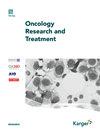Thoracic Oncology Highlights from the European Society for Medical Oncology Annual Meeting 2024: Non-Targeted therapy in Non-Small Cell Lung Cancer, Small Cell Lung Cancer and Thymic Epithelial Tumors.
IF 1.6
4区 医学
Q3 ONCOLOGY
引用次数: 0
2024年欧洲医学肿瘤学会年会的胸部肿瘤学亮点:非小细胞肺癌(NSCLC)、小细胞肺癌(SCLC)和胸腺上皮肿瘤(TET)的非靶向治疗。
2024年欧洲医学肿瘤学会(ESMO)大会公布了各种试验的关键新数据,这些试验继续探索免疫治疗(ICI)在非小细胞肺癌(NSCLC)和小细胞肺癌(SCLC)中的细微差别。在早期肺癌的围手术期,免疫检查点抑制剂治疗的额外数据被提出,旨在加深对潜在预测标志物的认识。亚得里亚海对有限期SCLC的最新研究提供了对不同亚组的新见解,包括放射治疗不同方面的影响和铂双重化疗的选择。在非小细胞肺癌姑息治疗的背景下,一些研究侧重于优化一线治疗,例如通过结合抗tigit或LAG-3抗体。此外,针对晚期NSCLC患者的耐药途径的问题也得到了解决。低剂量派姆单抗与标准剂量派姆单抗治疗晚期NSCLC的目的是降低治疗水平。胸腺上皮肿瘤(TET)和免疫检查点抑制剂(ICI)联合Lenvatinib治疗的初步数据在PECATI试验中公布。
本文章由计算机程序翻译,如有差异,请以英文原文为准。
求助全文
约1分钟内获得全文
求助全文
来源期刊

Oncology Research and Treatment
ONCOLOGY-
CiteScore
3.20
自引率
0.00%
发文量
84
期刊介绍:
With the first issue in 2014, the journal ''Onkologie'' has changed its title to ''Oncology Research and Treatment''. By this change, publisher and editor set the scene for the further development of this interdisciplinary journal. The English title makes it clear that the articles are published in English – a logical step for the journal, which is listed in all relevant international databases. For excellent manuscripts, a ''Fast Track'' was introduced: The review is carried out within 2 weeks; after acceptance the papers are published online within 14 days and immediately released as ''Editor’s Choice'' to provide the authors with maximum visibility of their results. Interesting case reports are published in the section ''Novel Insights from Clinical Practice'' which clearly highlights the scientific advances which the report presents.
 求助内容:
求助内容: 应助结果提醒方式:
应助结果提醒方式:


